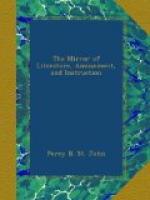* * * * *
INVITATIONS.
As a certificate of your intention to be punctual, you may send your friends, a similar billet to the following:—
My dear Sir,
The honour of your company is requested to dine with —— on Fryday, 1828.
The favour of a positive answer is requested, or the proffered plate will be appropriated as it was when—
Sir Ill-bred Ignorance returned the following answer:—“I shall be quite happy to come if I possibly can.” Such words the committee voted were equivalent to these—I’ll come, if in the mean time I am not invited to a party that I like better.—Dr. Kitchiner.
* * * * *
GENEVA
Has very little, as a city, to recommend it. It is characterized by much active industry within doors, the savans and mechaniciens being pent up in their closets and ateliers, and very little gaiety pervades the promenades. Some parts of the town are sufficiently picturesque; the overhanging roofs, for which it is remarkable, are, however, too lofty to screen the pedestrian from the rain, especially if accompanied by a high wind, and form no shade from the sun. The pavement of the streets is bad, and their irregularity is a considerable drawback from the internal appearance. The pavement of the inclined plane in the Hotel de Ville, by which we gain the arduous ascent that conducts to the Passport office, is a curiosity of its kind, and perhaps unique. The city is tolerably well fenced in with walls within walls, draw and suspension bridges, and gates; while




